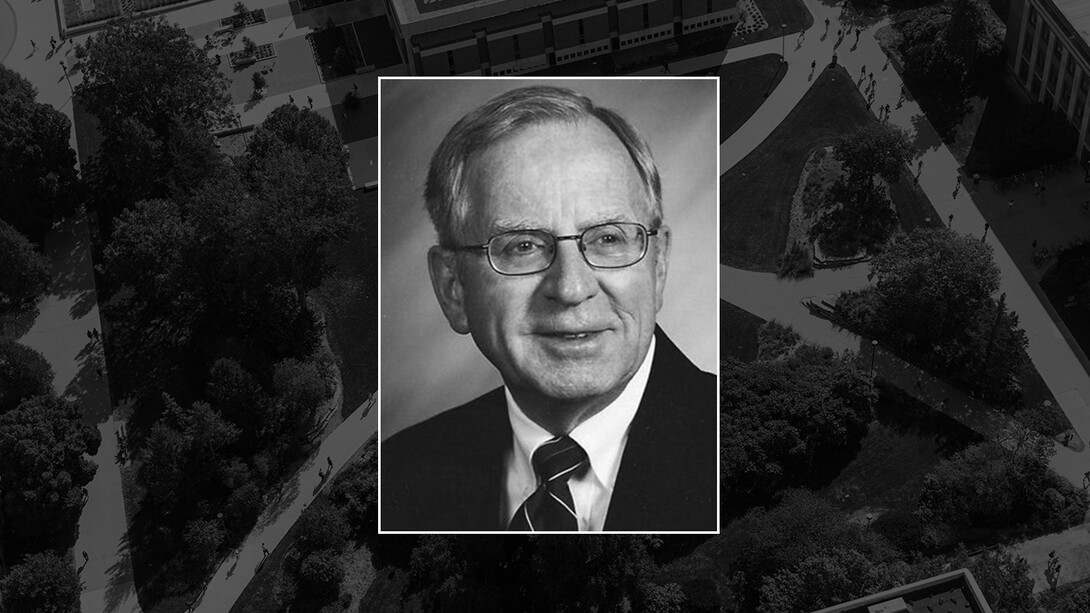
Duane Acker, who served as the first vice chancellor for the Institute of Agriculture and Natural Resources from 1974-75, has died in his hometown of Atlantic, Iowa. Acker demonstrated a strong interest in teaching, authored a longtime textbook on animal science and pursued wide-ranging international outreach on agriculture.
“Duane did a good job getting the institute up and started,” said Martin Massengale, who succeeded Acker as IANR vice chancellor in 1976 and who later served as university chancellor and then president of the University of Nebraska system. “There were a lot of things that had yet to be clarified, but when I arrived, Duane had done a good job getting things organized and off to a good start.”
Acker earned a Bachelor of Science in animal husbandry and a Master of Science in animal nutrition from Iowa State College and initially planned to become an animal nutritionist for a livestock feed company. While pursuing a doctoral degree at Oklahoma State University and working as an instructor there in the 1950s, he found that teaching held a strong appeal for him. His interest in teaching intensified when he returned to Iowa State as an associate professor of animal husbandry.
“My personal focus was always upon teaching,” he told the Atlantic News-Telegraph.
That focus on instruction and student needs continued when Acker served as IANR vice chancellor. He and his wife, Shirley, regularly opened their home in Lincoln to students, as well as faculty, Lincoln residents and university supporters.
“Duane was pretty oriented toward teaching and students,” Massengale said.
At the time of his recruitment to IANR, Acker was dean of agriculture and director of the Cooperative Extension Service at South Dakota University after serving as associate dean of agriculture at Kansas State University.
Acker left IANR in 1975 to become president of Kansas State University, serving until 1986, when he was named the head of food and agriculture programs at the U.S. Agency for International Development. In 1990, he joined the U.S. Department of Agriculture as head of the Foreign Agricultural Service. In 1992, he became USDA’s assistant secretary for science and education.
At the end of the Bush administration in 1993, Acker and his wife, Shirley, returned to their farm in Atlantic.
State law created IANR and the vice chancellor position in 1973 following calls from Nebraska agricultural leaders for the university to strengthen its support for agriculture. State senators and university leaders debated various proposals until settling on a final plan signed into law on May 25, 1973.
Under that restructuring, IANR in its initial structure included the university’s College of Agriculture, experiment station, Extension, Water Research Institute, Nebraska statewide geological survey and what is now the Nebraska College of Technical Agriculture.
Working diplomatically to advocate for IANR and build constructive relationships within the university structure was a key task for Acker at that early stage, Massengale said.
Acker was elected a fellow of the American Association of the Advancement for Science and the American Society of Animal Science. He authored numerous articles on animal nutrition and curriculum planning, and his 1963 textbook “Animal Science and Industry” went through seven editions.
Acker’s wide-ranging involvement in international agricultural education and advisement began in the 1960s, during his time as an associate professor at Iowa State. In the 1990s, in his international work for USDA and USAID, his focus on educational outreach to producers continued.
Those efforts, he said, aimed to show producers worldwide that agriculture is “the starter engine in developing a country.”
Memorial details are available here.







